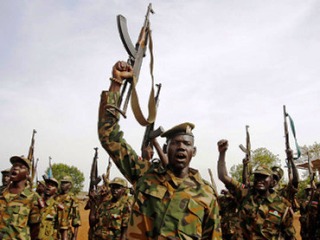South Sudan starts withdrawing troops from border zone with Sudan
January 19, 2013 (WAU) – South Sudan has started withdrawing its troops from the border with Sudan, according to senior government officials, to allow a buffer zone to be created between the two nations.

“By withdrawing its forces … the government of South Sudan is clearly demonstrating its full compliance with the signed security agreements and full commitment to their implementation,” says a statement the South Sudanese government issued on Thursday.
The September Cooperation Agreement had appeared to be a breakthrough in relations between the two nations, which have soured since South Sudan’s independence in July 2011.
The impasse was largely caused by the failure to implement the security element of the deal. Sudan accuses South Sudan of backing rebels in South Kordofan and Blue Nile, while Juba denies this and has accused Khartoum of bombing its territory – most recently at the end of December and beginning of January.
However, at a Presidential summit in Ethiopia, South Sudan’s Salva Kiir and Sudan’s Omar al-Bashir agreed to implement all existing agreements. Sudan says that operationalising the buffer zone and the other security issues are a precondition for allowing South Sudan’s oil to resume passing through its territory for export.
Before the January 2012 shutdown, revenue from South Sudan’s 350,000 barrels per day (bpd) output accounted for 98% of Southern government’s income. Juba had hoped to have been producing 230,000 bpd by December, but now it is anticipated that the pumps could be turned on again in February, with South Sudan crude oil reaching international markets through Port Sudan by April.
But this remains contingent on the security deal being implemented.
Thursday’s statement, which bears signature of South Sudan’s Defence Minister John Kong Nyuon and Justice Minister John Luk Jok, asserted that the withdrawal was in full compliance with the road map put forward by the African Union Peace and Security Council, which was endorsed by the United Nations Security Council.
“This withdrawal was completed within the time frame that has been agreed by the Parties. This is the first step in the separation of forces and the full operationalisation of the SDBZ (10km withdrawal from the centerline”, the statement reads in part.
The “centreline” away from which the two sides should withdraw, proposed by the African Union mediation led by Thabo Meki’s High-Level Implementation Panel (AUHIP), has been a point of contention.
Under the proposal, the “centreline” is nonbinding and will have no influence on the resolution of disputed areas and any final border agreement. Large areas of the 2,000km border remain undemarcated.
At a meeting of the bilateral Joint Political and Security Mechanism in Addis Ababa, Ethiopia convened by the AUHIP from 14-15 January, South Sudan “fully accepted the full demilitarization of the “14 mile area”. The issue on Mile 14’s inclusion has proved controversial in the South Sudan, especially in Northern Bahr el Ghazal State where the Malual Dinka claim that the ownership of the fertile grazing area is not in dispute.
South Sudan said the withdrawing of its troops from Mile 14 would take 47 days from the day the pullback commences.
The acting chief negotiator, Minister John Luk Jok noted: “By withdrawing its forces south of the centreline of the temporary administrative and security map of the AUHIP and agreeing to the full demilitarization of the SDBZ and the 14 miles area, the Government of South Sudan is clearly demonstrating its full compliance with the signed security agreements and full commitment to their implementation.”
Jok said his government expects the Government of Sudan to similarly implement fully and unconditionally the security agreements and all other agreements embodied in the Cooperation Agreement of 27 September 2012, explaining that, “these agreements lay the foundations for mutual viability of both our nations and enduring peace between our peoples.”
Meanwhile, South Sudan’s Defense Minister added that: “In addition to the withdrawal of the troops south of the centerline, we have also started the redeployment of our forces from the Safe Demilitarized Border Zone (10km withdrawal from the centerline), which will be completed by the deadline of 4 February 2013.
However, Colonel Phillip Aguer, the spokesman of the South Sudan army (SPLA) said “the matrix of withdrawal with clear time frame has not come out” and the process needs to be coordinated on both sides.
(ST)
